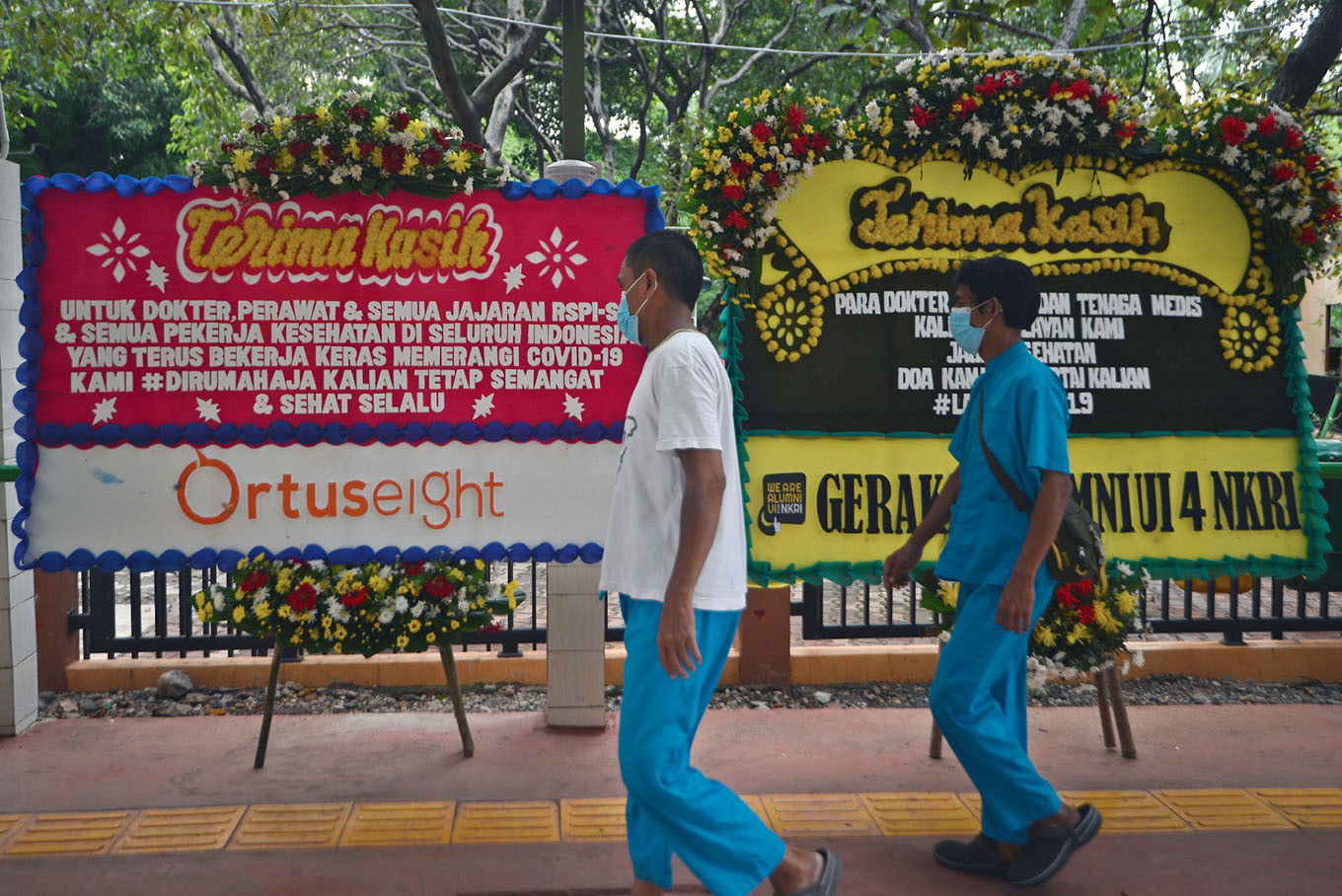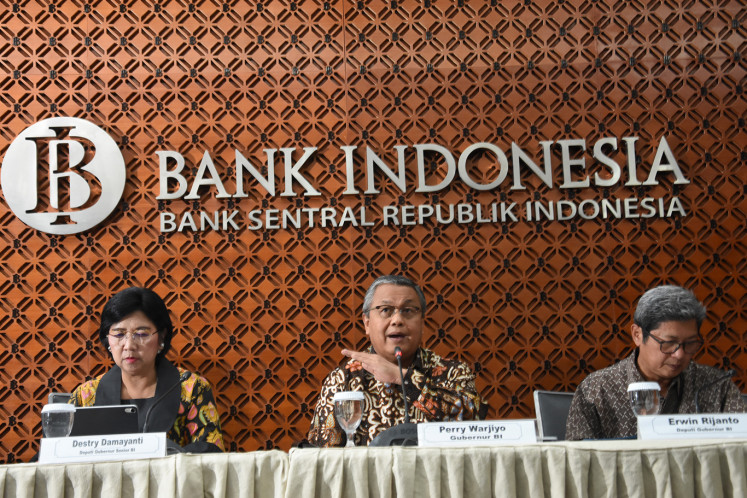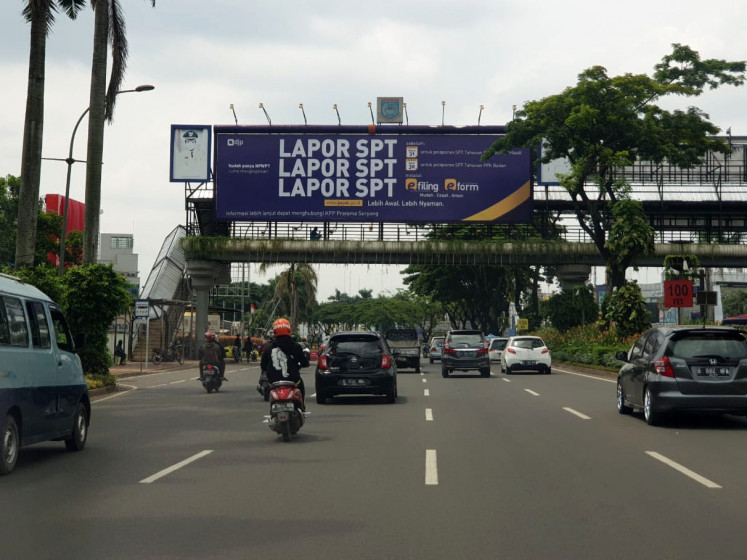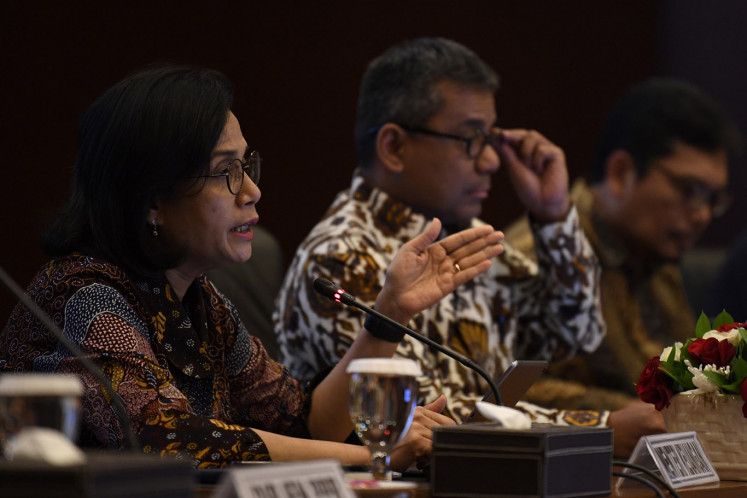Popular Reads
Top Results
Can't find what you're looking for?
View all search resultsPopular Reads
Top Results
Can't find what you're looking for?
View all search resultsIndonesia’s COVID-19 stimulus playbook explained
Jokowi signed a Perppu to legitimize much more state spending and financial relief efforts as Indonesia’s COVID-19 emergency response.
Change text size
Gift Premium Articles
to Anyone
P
resident Joko “Jokowi” Widodo signed on Tuesday a government regulation in lieu of law (Perppu) to legitimize much more state spending and financial relief efforts as Indonesia’s COVID-19 emergency response to cushion the battered economy.
The Perppu, which takes effect on Tuesday, gives leeway for the government to afford the COVID-19 battle, which Jokowi said would catapult the state budget deficit to 5.07 percent of gross domestic product (GDP), beyond the legal limit of 3 percent for the first time in history.
Indonesia will spend an extra Rp 405.1 trillion (US$24.6 billion) from the 2020 state budget for medical needs, the social safety net and relief for small and medium businesses as the pneumonia-like illness has infected more than 1,500 people and killed 136 as of Tuesday afternoon while disrupting business activities nationwide.
The government projected the country’s economy could grow significantly slower by 2.3 percent this year and could even contract by 0.4 percent in its worst-case scenario from 5.3 percent stipulated in the 2020 state budget. The World Bank also slashed its projection of Indonesia’s economic growth to a baseline 2.1 percent if the situation starts to normalize by June.
Read also: World Bank calls for safety net, drastic action in Indonesia’s fight to contain COVID-19
“It is deemed necessary to conduct extraordinary policies and steps regarding the state’s finances, including taxes and regional spending, and the finance sector, which need to be immediately taken by the government and relevant institutions in order to overcome pressing matters, to ensure health aid, national economy,’ reads the Perppu. ‘The focus will be on health spending, the social safety net and recovery of the affected businesses.”
Here are some key takeaways to navigate through the new rule.
Budget deficit relaxation
The Perppu relaxes the state budget deficit legal limit from the current 3 percent of GDP, a cap introduced after the 1998 Asian financial crisis that has never been exceeded by the government.
Article 2 section 1 (a) of the Perppu stipulates that the government has the authority to set a budget deficit limit beyond 3 percent of GDP during the COVID-19 response period and/or to face threats to the national economy and/or financial stability until the end of 2022.
Furthermore, the government will gradually lower the budget deficit until eventually in 2023 the limit would return to 3 percent of GDP.
The decision to widen the deficit is the first in history as the country declared a public health emergency involving large-scale social restrictions that disrupt businesses and hit informal workers and vulnerable people. Indonesia’s 2020 state budget originally planned for Rp 2.54 quadrillion in state expenditure with a budget deficit of 1.76 percent of GDP, equal to Rp 307.2 trillion.
Read also: Indonesia announces Rp 405 trillion COVID-19 budget, anticipates 5% deficit in historic move
Lifeline from Bank Indonesia through direct government bond purchases
Article 2 section 1 (f) of the Perppu states that the government has the authority to issue state bonds or sharia sovereign bonds with a specific purpose, specifically to deal with the COVID-19 pandemic, and the bonds might be purchased by the central bank, state-owned companies, corporate investors and/or retail investors.
Article 16 section 1 (c) allows Bank Indonesia (BI) to purchase the bonds in the primary market to resolve the problems in the financial system that put the national economy in peril.
The law on BI prohibits the central bank from buying government bonds except in the secondary market.
Article 19 sections 1 and 2 stipulate that the central bank might purchase the bonds in a primary market.
Bank Indonesia Governor Perry Warjiyo (center), Senior Deputy Governor Destry Damayanti (left) and Deputy Governor Erwin Rijanto give press statement in Jakarta on March 2. (Antara/Indrianto Eko Suwarso )The proceeds from the bonds sales are to be used by the government for national economic recovery, including to ensure the sustainability of the state financial management, to provide loans and capital injection for the Deposit Insurance Corporation [LPS] and to finance banks’ restructuring during the crisis.
Further regulations on the scheme and the mechanism for bond purchase are to be jointly regulated by the finance minister and the central bank governor.
Read also: Explainer: BI to throw lifeline to Indonesia’s economy to fight COVID-19
The secretary to the coordinating economic affairs minister, Susiwijono Moegiarso, said previously that the so-called recovery bond can be bought by BI, as well as by exporters and importers.
"The government will handle the proceeds of the funds to finance all businesses. This is to awaken business activities," Susiwijono said during a media briefing on Thursday.
Liquidity loans from BI to systemic banks
Article 16 of the Perppu gives BI the authority to disburse sharia short-term liquidity loans or financing for systemic or non-systemic banks that face liquidity problems. The central bank is also allowed to give special liquidity loans to systemic banks that face liquidity issues but are not eligible for the sharia short-term liquidity loans.
In the event a systemic bank still faces liquidity problems after getting the short-term loan, it can ask for a special liquidity loan from the BI. The central bank would then coordinate with the Financial Services Authority (OJK) to hold a Financial System Stability Committee (KSSK) meeting to decide whether the special loan will be granted.
Further schemes and mechanisms for disbursing the special liquidity loans will be jointly regulated by the finance minister and the BI governor.
Reduction of capital injections for state companies
Article 2 section 1 (e) (5) of the Perppu stipulates that the government has the authority to use the funds sourced from a reduction of state capital injections (PMN) for state-owned companies to meet the state budget needs.
The 2020 state budget allocated Rp 17.73 trillion worth of PMN to several state-owned enterprises (SOEs), including electricity company PT PLN and construction company PT Hutama Karya.
Corporate income tax
The Perppu cuts permanent establishment (BUT) and corporate income tax to 22 percent this year and in 2021 and to 20 percent in 2022 from the current 25 percent, according to the Article 5 section 1.
Listed companies that sell more than 40 percent of their shares to the public and meet certain requirements will be eligible for an additional 3 percent cut.
The reduction of the corporate income tax was initially proposed in the omnibus bill on taxation, which had been submitted to the House of Representatives for deliberation, in a bid to improve the business climate in the country and attract more investment.
Read also: 'File your tax returns': Tax office intensifies efforts to collect taxes as budget burdens multiply
Finance Minister Sri Mulyani Indrawati estimated in February that the cut would lower tax revenues by up to Rp 86 trillion annually but the government would widen the tax base and maximize spending to avoid economic shock. The gradual cut, she added, would allow companies to have more room for expansion.
Digital economy tax
The government will be able to charge value added tax (VAT) on taxable intangible goods and/or services sold through e-commerce platforms and charge income tax or electronic transaction tax on e-commerce done by foreign individuals or digital companies that have a significant economic presence, according to Article 6.
The significant economic presence will be determined through the companies’ gross circulated product, sales and/or active users in Indonesia. Those with a significant economic presence will be declared permanent establishments and, thus, would be subject to domestic tax regulations.
If the government cannot declare a digital company a permanent establishment because of the existence of a tax treaty with a certain country, it will then charge an electronic transaction tax on the company’s sales in Indonesia.
Further provisions on the rate, object and calculation of the income tax and the electronic transactions tax will be regulated in a government regulation (PP).
A banner shows a message to "file your tax returns" attached to a footbridge in Bumi Serpong Damai, South Tangerang, Banten, on March 11, 2020. (JP/R Berto Wedhatama)Article 7 regulates that digital companies that fail to comply with the rules will face administrative sanctions in accordance to the General Taxation Law’s regulations. Furthermore, the communications minister can cut the companies’ access if they refuse to pay the taxes.
The regulations are also mentioned in the omnibus bill on taxation as the government struggles to tax digital giants operating in the country, such as Netflix and Spotify.
Crisis protocol
The Perppu’s Article 27 regulates that the funds that have been spent by the government and/or the KSSK’s members in order to implement the state budget policies, including the policies on taxation, on state spending, on regional finance sector, on financial system stability and on the national economic recovery program, are parts of the economic cost intended to save the economy from crisis and not regarded as state losses.
The KSSK’s members are the officials of BI, the Finance Ministry, the OJK and the LPS.
Officials of the KSSK, the Finance Ministry, the central bank, the OJK and the LPS and other officials related to the implementation of the Perppu cannot be sued in civil proceedings or face criminal charges, if they are conducting their tasks with good intentions and in accordance with the prevailing laws.
Furthermore, the Perppu also states that all of the actions, including the decisions taken based on the Perppu, are not objects for disputes in administration courts.
The government realized that it had to be extra careful in implementing the Perppu to avoid moral hazards, Sri Mulyani told a teleconferenced press briefing on Wednesday.
Finance Minister Sri Mulyani Indrawati (left) and Deputy Finance Minister Suahasil Nazara (center) gesture during a press briefing on the realization of the 2020 State Budget and Expenditure (APBN) in Jakarta on Feb. 19. (Antara/Puspa Perwitasari)“We will compose the safeguard rules of the game so that the efforts made by the officials who are working to improve the people’s health, welfare and social economy will not be tainted by some people’s moral hazards that will result in the prosecution of policymakers,” she said. “The implementation still takes into account good corporate governance and transparency.”
Regional treasury
The Perppu gives regional administrations the authority to refocus the use of their budgets on certain activities, alter the allocation and use the regional budget income and spending during the pandemic with further provisions regulated by a home ministerial regulation.
Home Minister Tito Karnavian said earlier this month that regional leaders should focus on sustaining the economy and containing COVID-19 when spending their budgets.
Read also: Minister gives village, local leaders pep talk on using budget to cushion COVID-19 effects
“For village heads, focus on labor-intensive programs. District heads should also streamline the review process,” he said in Bandung, West Java. “Please wrap up the process soon so the village funds could be quickly proposed to the Finance Ministry and immediately transferred.”
The government has allocated Rp 72 trillion for village funds and Rp 784.9 trillion for regional transfers in the 2020 state budget.













